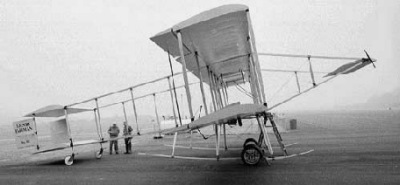|
|

Henri Farman

The Henri Farman III, one of the most famous and widely used of
early European biplanes, was the first aircraft produced by Farman's
factory in France. It had full ailerons which made it controllable
by giving roll, or banking, control as well as sprung wheels on the
landing skids to come " ... to earth most perfectly and with the
least shock." It won distance, altitude and passenger carrying
awards at the Rheims air meet of August 1909. Farman had earlier
been the first in Europe to fit practical ailerons to an airplane; a
Voison-Farman I bis, in October 1908. The Farman III was the first
aeroplane to fly from England to Ireland.
Farman aircraft were in fact
Voisin designs. Much to the annoyance of Voisin, Farman would make
minor modifications and rename the product Farman.
Specifications: span 34 ft. 6 in.; length 43 ft. 6 in.; takeoff
weight 1270 lbs.; engine 50 hp. Gnome seven-cylinder air-cooled
rotary (original); 150 hp. Lycoming air-cooled flat four
(representation); speed 45 mph.
|
|
